Four Days in June Read online
Page 9
Wellington’s centre was wide open. Now, thought Ney. Now was the time. He saw Rollin, remounted after losing his own horse. Called him over. Quickly dictated a single line to d’Erlon.
General. Do not lose a moment. Bring me I Corps.
‘Go. Find him. Bring him here. Now.’
One push would do it. But he needed d’Erlon. Rollin was not 100 yards away when his horse crossed paths with the figure of de la Bedoyere, making for the marshal. The young general rode up to Ney.
‘An order, sire. From the Emperor.’
Ney took the folded parchment. It was an unsigned note, in pencil. It bore no time, but he seemed to recognize Napoleon’s hand. It ordered d’Erlon to march with his corps at once towards Ligny. To fall on Blü cher’s right flank. De la Bedoyere spoke:
‘I trust that you will forgive me, sire. I have already taken the liberty of enforcing the order myself. I passed General d’Erlon on the way here. He is at this moment marching on Blücher.’ He smiled at Ney. The marshal spoke softly.
‘You have what? You have ordered General d’Erlon where?’ His voice rose alarmingly. De la Bedoyere stopped smiling. ‘Forgive you? Forgive you? What have you done? How dare you. General d’Erlon’s corps is my command. I have ordered him here. Here. With him here we can crush Wellington. Where is he? Where is d’Erlon?’
‘Sire, the Emperor expressly informed me – ’
‘Informed you? You, boy? I’ll inform you, boy. I’ll tell you. I know what the Emperor wants. He wants me to kick Wellington’s arse. And then he wants me to march to him and to do the same to Blü cher. That’s what the Emperor wants. And to give it to him I must have d’Erlon. Here.’
De la Bedoyere said nothing. He had gone quite pale. For a moment he stared at Ney. Then he reined his horse around and rode back to Fleurus. He was not quite out of sight when another officer rode up. Even in his rage, the marshal recognized him. Colonel Forbin-Janson, of Soult’s staff.
‘Sire, I come with a message from the Emperor.’
He was in the motion of producing a despatch from his waistcoat pocket when he added something that Napoleon had told him to say in person. ‘He, the Emperor, sire, begs me to inform you that you are to finish the business at Quatre-Bras, without further ado. His words, sire.’
Ney looked incredulously around at his staff. Tried to meet their eyes. Heymes and Flahaut looked down at their reins. The marshal’s cheeks, already red with the heat of battle and his annoyance with de la Bedoyere, now deepened in tone to a livid purple. Looking away at the horizon, he opened his mouth in a scream which even on the battlefield was audible at 100 yards. An animal noise of pure rage. Gradually it subsided. Ney clenched his fists. Finally he turned on the colonel, able at last to articulate his fury.
‘His words? His words? You bloody imbecile. You idiotic, pompous ass. His words? His words? I don’t need bloody words. Not even the Emperor’s bloody words. I need men. I need d’Erlon. What do you mean, “finish the business”? Without d’Erlon “the business” as you call him – Wellington – is going to finish me. Tell him that, you stupid ass. Tell the Emperor that unless I have reinforcements it won’t be the English but me that’ll be finished. Tell him that.’
Forbin-Janson was staring – at nothing. Unable to speak.
Ney began to calm down. ‘I’m sorry, Colonel. What I should have said was, “Please inform his Majesty of exactly what you have seen here.” Tell him that I am opposed not by a token force, but by the whole of Wellington’s army. That I am even now, I suspect, outnumbered. That I will nevertheless hold on despite this and despite the fact that General d’Erlon has not yet arrived. As he has not yet arrived. As he is at this moment marching … elsewhere, I am very much afraid that I am unable to promise his Majesty any more than this. Tell him that.’
Embarrassed, confused, the colonel, red-faced and wide-eyed, saluted, released his hold on the now forgotten despatch and rode away.
Ney was confused. What now were his orders? There was only one course of action. To follow his instinct. It told him that he must defeat the English. And to do that he needed d’Erlon.
A third horseman appeared among the staff. Delcambre, Chief of Staff to d’Erlon, and with him a bewildered-looking Rollin.
‘Marshal, I have to inform you that General d’Erlon is, at the Emperor’s request, on his way to Ligny.’
Ney groaned. ‘I know that, you fool. Don’t you know that I know that? Now let me tell you what to do. Listen carefully, Delcambre. Do not mistake my words. This is what you are going to do. You are going to ride back to General d’Erlon, wherever he might be – on the road to Ligny, or on his way back to Paris. And you are going to bring him back here. To me, Delcambre. Bring him to me. And then together, Delcambre, you, me, General Reille and General d’Erlon, we are going to smash the English. Then we will all go to Ligny. Do you understand?’
‘Sire.’
‘So do it.’
As the colonel galloped away on his thankless mission, a roundshot, fired by a troublesome, newly-arrived battery of English horse artillery, came flying towards the hill, headed directly for the group of staff officers around Ney.
It hit the earth just before the marshal’s horse, bounced up and seared a bloody channel straight through the animal’s belly. The horse reared in agony, tossing Ney off to one side, before toppling over and away from him. The cannonball continued to ricochet, taking a leg off one of Ney’s junior aides and going on past the staff to disembowel a young lieutenant of Foy’s infantry.
Cursing, Ney got to his feet. Heymes trotted up, holding the reins of a fresh horse which fifteen minutes earlier had belonged to a major of chasseurs who, as he explained to the marshal, ‘no longer had need of it’.
This moment, Ney knew, was the crisis of the battle. If only he could act now, play for time, while d’Erlon was coming ever nearer, Wellington would be defeated. He looked for precedents. Alexander? Frederick? But his fuddled mind found none. He tried to rationalize. To consolidate what men he had.
All three divisions of infantry were fully engaged in holding the line. Of his lancers, one regiment had been mauled in the aftermath of the engagement with the Highlanders. The other, though, was relatively fresh. And then there were the heavy cavalry. He thought of Borodino. Of Murat and himself, wild with battle, at the head of a horde of cuirassiers. Borodino. There for the first time his bold initiative had won in the face of the Emperor’s indecision. It could happen again. Cavalry. Cuirassiers. Looking about, he found Heymes. Shouted across to him through the din of cannon fire.
‘Take a message to General Piré. No time to write. Tell him, from me, the 5th Lancers must ride directly into the centre of the Allied line. Attempt to pierce it, to enable General Kellerman to exploit the breach.’
Turning in the saddle he found Kellerman, uniformed as was his custom in the half armour of a cuirassier, in conversation with Rollin.
‘Kellerman. Your cuirassiers. You’re ready?’
‘Sire. I have only one brigade. The rest of my men remain in reserve. I’m not sure, sire, precisely where – ’
‘I don’t care how sure you are. Do you understand? You charge with whatever you have. You get your men, Kellerman, and you ride against that infantry.’ He was pointing now. Straight at the centre of the Allied line. At the redcoats. ‘You ride against them and you ride them down. Crush them. Go. Now!’
The general left in search of his one brigade. Ahead of him Ney could see Piré’s lancers already riding into three incredulous regiments of redcoats – one in kilts. He saw Scots and English officers pointing in alarm. Saw the sickening looks of realization as it quickly dawned on the redcoats that they had been caught. Saw two battalions hurrying to form square. The other had no time. He saw the lancers riding round and round, taking their time to choose their targets, as cool as a hunting party, pigsticking. Caught in the open, the defenceless infantrymen tried to parry lance with musket and soon saw with horror the futility of their attempts
to stop the inevitable. It was quickly over, the destruction of a battalion.
And now, on his left, Kellerman was underway. Ney felt the earth tremble as the 500 armoured cavalry on their shining black horses switched from trot to gallop. At their head, sword raised high, next to Kellerman, rode their commander, Baron Guiton, the hero of Eylau. Unstoppable, the dazzling blue and silver juggernaut rolled smack into the red line, and disappeared in a cloud of white smoke. It was hard to make out from here exactly what was happening. And then, as the smoke drifted, Ney saw a small miracle. What had been a battalion of redcoats in square was being cut to pieces by cuirassiers. One Frenchman had seized an English colour – a sheet of green and gold silk – and was carrying it back to the lines.
Another British battalion had been forced sideways by the shock of the charge; driven into Bossu wood and on to Reille’s waiting infantry. Ney saw Kellerman himself, surrounded by a troop of Guiton’s men, at the junction of the crossroads.
By God, he thought. We’ve taken the road. With cavalry alone. He had known it was possible. Now all that he had to do was to support them with infantry and the day was his. Where was d’Erlon? This was the moment. Now. Only now. Not to act now and it would be gone.
And, all too soon, it was. Within minutes, when Ney looked again at the crossroads, he saw two fresh red-coated battalions move methodically across the field and towards the cuirassiers. As they changed formation from column into line, another British horse battery opened up. And as they did so, Kellerman wheeled round and found another target. A second battalion of Highlanders. This time, though, there was no momentum for a charge. The cuirassiers approached at no more than a trot, and at thirty yards out the first Scottish volley stopped them in their tracks. Enfiladed now by the English on their flank, the French cavalry began to retire. Slowly, they came back towards the lines. Riding and walking. In twos and threes, mustering in bloodied troops and squadrons. And with them, out of the smoke, came Kellerman, unhorsed and holding on by his hands to the bridles of two horses. He was not wounded, but had suffered a badly sprained ankle.
Ney knew now that the moment had passed. Refused to admit it. Looked around. The bulk of his staff, it seemed, had just melted away. Killed, wounded or unmounted. Rollin was clutching a bloodied arm. Heymes, though, was still up with him. And Flahaut. Where was d’Erlon? But in his heart, he knew that it was too late. That I Corps were still on the march. Caught somewhere between here and Ligny. Caught between two battles. Between two sets of orders. Caught between two commanders. It was up to him now to finish this business. He was hatless, and soon horseless again as his third mount of the day now panicked, unseated him and ran off into the Allied lines. Ney prepared to advance on foot. He wiped his forehead with his hand. Closed his eyes. When he opened them, staring for a moment towards the ground, he saw in the mud the unexpected whiteness of a piece of paper. He bent to pick it up. Could barely make out the smudged words: ‘By hand of Colonel Forbin-Janson’. It was from Soult. Timed: ‘Fleurus 3.30’.
Marshal,
I indicated an hour ago that the Emperor would attack at 2.30 the position between St Amand and Brye. At this moment that action is taking place. His Majesty has instructed me to inform you that you must manoeuvre immediately edgewise to encircle the enemy’s right flank and fall upon his rear. If you act vigorously the Prussian army will be lost.
The fate of France is in your hands.
The fate of France. Ney smiled. Closed his fist around the paper until it was a tight ball. Then, thrusting it into his pocket, he raised his sword and marched alone towards the front of Foy’s skirmish line.
TEN
Ligny, 6.15 p.m. Napoleon
From the observation platform, built that morning by the engineers of the Garde around the upper storey of a windmill high above Ligny, the Emperor gazed out in silence across the smoking valley. He was becoming irritated by a straggling lock of hair which had stuck to the beads of sweat coursing down his face. He pushed it aside and scratched at his forehead, before returning his hands to their habitual position, crossed behind his back, hard against the tails of his green coat. He pulled them tighter together, turned quickly and walked back inside the mill. Five staff officers sprang to attention. Grabbing a piece of paper from the sheaf which lay ready on a millstone, Napoleon took a pencil and wrote on it one word, ‘Marbais’, underlining it ten times with frenzied strokes, before pinning it to a low beam.
‘Marbais, gentlemen. That is the key to the battle. At precisely seven o’clock this evening Count d’Erlon’s corps will arrive on the field of battle, between Marbais and Wagnelée, to our north west and strike directly into the right wing of the Prussian army.’
Soult, as ever, was on hand. ‘Sire. If Count d’Erlon carries out your orders to the letter, then surely the Prussians are lost.’
Napoleon, not bothering to reply, looked down at the white, flour-coated boards of the mill. Well, of course Soult was right, with his irrelevant, sycophantic comment. It was a brilliant plan. Blü cher was beaten. And now was the time for the coup de grâce. D’Erlon and the Garde would attack together. The one on the flank, at Wagnelée, the other directly into the centre. A battering ram and an iron glove to smash the Germans. Forever.
Walking out from the mill on to the platform, he was hit by the blanket of heat which rose from the conflict below, which had been raging since the early afternoon. He looked out across the plain. Noticed that the Prussians were manoeuvring to their right, weakening their centre. That would do. The right was strong. Vandamme secure at St Amand.
He was not, at first, aware of the arrival directly below him of an officer of chasseurs who, dismounting, ran to the slim wooden stairs and climbed to the platform. Seeing Gourgaud, the lieutenant saluted and began his desperate message.
Without dropping the glass from his eye, Napoleon gestured to the staff colonel. ‘Let him through, Gourgaud. Bring him here. What news?’
‘Sire. Belgians. On our left, sire. I come from General Vandamme at St Amand, your Majesty. We are about to be attacked.’
Napoleon lowered the telescope and looked more closely at the agitated young man. ‘You’re sure? Sure that they’re Belgians?’
‘A large body of troops, sire. Perhaps 20,000 of them. In dark blue, advancing upon our flank.’ He pointed in the direction of the Roman road to the south west.
Napoleon walked round the platform, to the west side of the mill. Was it possible? Had Wellington managed to break free from Ney? He peered again through the telescope. Kept it to his eye for a full minute.
The man was right. There was no doubt about it. There it was, on his left flank. A long, dark column of marching men. In effect they were moving not into, but actually behind his flank. Making directly for the Imperial headquarters.
He tried to estimate how many. Perhaps 5,000 visible in the vanguard? They must be Belgians. Even at this distance the column was too dark for English red. And they could not possibly be d’Erlon’s men. They would be in entirely the wrong place. Some 5 kilometres too far south. Napoleon looked away and walked over to the map which lay, weighed down by stones, on a large, up-ended wooden barrel. Whoever they were, they were heading for the village of Wagnée.
He froze. Looked up and absently out into space. No. It was ridiculous. Absurd. But in war anything was possible. Particularly the ridiculous. Could it be? De la Bedoyere himself had taken the message to Ney ordering d’Erlon to march on Wagnelée and Marbais. Had written it himself. But what exactly had he written? Might it be possible that, in his haste, the young general had written not Wagnelée, but Wagnée? Of course it was possible. Damn this hot, damp country, with its vile Flemish names. Wagnée. Wagnelée. Gosselies. Herpignies. He looked again at the map. It was more than possible. It was certain. Napoleon put the cool brass rim of the telescope back to his eye. Looked more closely. Saw the square of a regimental colour floating above the column. Tried to make out detail. A tricolor. The glint of an eagle. There was no need to look aga
in. They were French. D’Erlon. He snapped the telescope shut. Turned to the staff.
‘French. They’re French. It’s d’Erlon. Soult, tell me, what in God’s name is d’Erlon doing heading for my left flank? Where are his scouts? Why has he sent no advance warning of his arrival? Are all my generals incompetent? Must I do everything personally?’ He brought his fist crashing down on the makeshift map table, sending the stones flying ‘Gourgaud. Corbineau. Send an aide to observe the head of column. I need immediate confirmation that it is d’Erlon.’
There was no harm in making sure.
No sooner had the courier left, along with the confused lieutenant of chasseurs, than another messenger reined in his horse below the mill. An infantry lieutenant this time. Gourgaud motioned him to speak.
Napoleon stared at him. What now?
‘Sire. General Vandamme begs to inform you that his men are becoming increasingly perturbed by the presence of the unidentified column advancing on his left, sire. He asks for reinforcements, sire. Otherwise he will be forced to abandon his position at St Amand.’
Napoleon shook his head. ‘Very well. Gourgaud. Have someone find General Duhesme. Tell him to take the Young Guard and move across to reinforce St Amand. And make certain that whoever takes the message tells General Duhesme, from me. From me. I am giving him a chance to re-acquaint himself with this ground. Tell him that if he does as well here today as he did on this same battlefield in 1794 then we will all breakfast in Brussels. And for God’s sake, Gourgaud, tell Duhesme to tell Vandamme not to panic. They’re French troops advancing on him. It’s D’Erlon.’

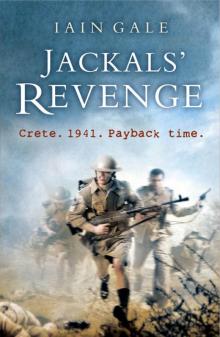 Jackals' Revenge
Jackals' Revenge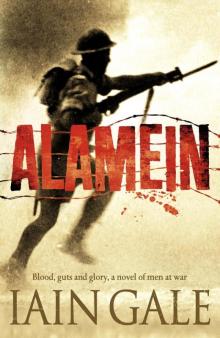 Alamein
Alamein Conspiracy
Conspiracy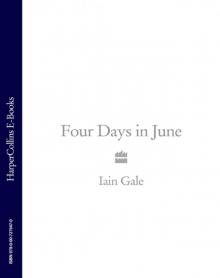 Four Days in June
Four Days in June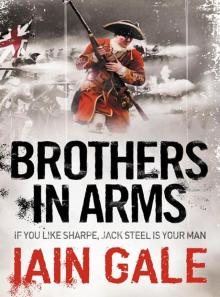 Brothers in Arms (Jack Steel 3)
Brothers in Arms (Jack Steel 3) Brothers in Arms
Brothers in Arms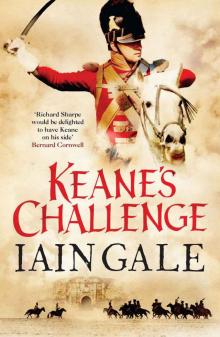 02 - Keane's Challenge
02 - Keane's Challenge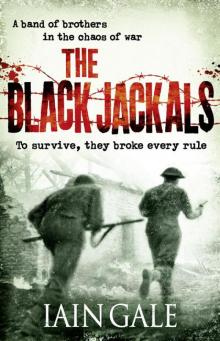 The Black Jackals
The Black Jackals Man of Honour
Man of Honour Rules of War
Rules of War